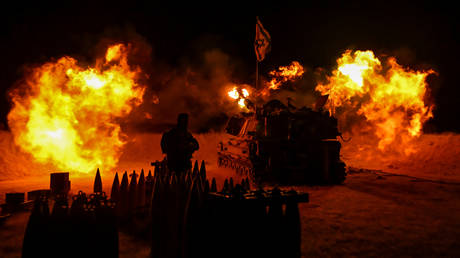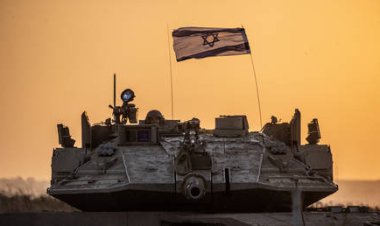A year into the conflict, Israel's cohesion falters and support dwindles
The article discusses the escalating tensions in the region following the Hamas attack and the subsequent IDF reprisal, which has brought the area to the brink of disaster.

On the morning of October 7, 2023, at around 6:30 am local time, Palestinian factions initiated Operation Al-Aqsa Flood, unleashing an estimated 2,500 to over 5,000 rockets from Gaza into Israel.
In the wake of this assault, over 2,000 armed fighters infiltrated Israeli territory through land, sea, and air, targeting kibbutzim and the city of Sderot. Approximately 1,200 Israelis lost their lives, including hundreds at a music festival, and 242 individuals were taken hostage.
In retaliation, the Israeli government declared martial law for the first time since 1973 and initiated Operation Iron Swords in Gaza. This occurrence marked a new escalation in the enduring Middle Eastern conflict, which has since transcended Israel and Palestine, splitting the global community into supporters and critics of Israeli policies.
**Divided Israel**
By the first anniversary of the tragic events on October 7, 2024, the streets of Tel Aviv, Israel’s cultural and financial hub, were decorated with Israeli flags that displayed the Hebrew phrase “Beyachad Nenatze’ach.”
However, the situation on the ground painted a more complicated picture. Families of hostages in Gaza urged negotiations for their release, even if it meant conceding to Hamas, while posters honoring fallen soldiers demanded a continuation of the conflict until “complete victory.”
This division within Israeli society presents a significant dilemma: Should the release of hostages come at the cost of ending the war?
Even prior to October 7, Israeli society was marked by deep fractures, evidenced by months of protests against the government’s proposed judicial reforms. Mass demonstrations surged against Prime Minister Benjamin Netanyahu’s far-right administration, with opponents accusing him of aiming to dismantle Israel’s democratic framework and establishing himself as a de facto monarch.
After the tragedy of October 7, Israeli society succumbed to profound shock, with many believing the government was inadequately managing the crisis. Emergency civil centers were established to handle various needs, from funding the military to providing shelter for thousands displaced by the conflict, even working to replace immigrant laborers who had left farms due to the war.
In many respects, civil society and private initiatives stepped in to fulfill roles the government was unable to address, driven by a belief that they were best positioned to support the nation. Initially, it appeared that Israeli society was united in its grief.
However, a year later, that sense of togetherness has largely dissipated. Old divisions have reemerged, now focused on the war with Hamas and the fate of the hostages. Support for negotiations to secure their release has come to be associated with opposition to Netanyahu's management of the war.
Families of hostages face increasing hostility, both online and in the real world, experiencing slurs and even physical attacks. They are labeled “smolanim”—a term with long-standing derogatory implications in certain Israeli circles. For many supporters of Israel’s far-right government, the campaign for hostages’ release is perceived as a tool wielded by the opposition to weaken Netanyahu’s administration.
Amid the most deadly terrorist attack in Israel’s history, a subsequent war with Hamas, ongoing conflict with Hezbollah in the north, and tens of thousands of displaced Israelis, a crucial question surfaces: Do Israelis feel any safer?
A survey by the Institute for National Security Studies in September 2024 revealed that 31% of Israelis reported feeling “low” or “very low” levels of security, while only 21% felt “high” or “very high” levels of safety.
Even before the events of October 7, the rate of emigration from Israel had been rising. Data from Israel’s Central Bureau of Statistics indicated that more citizens departed the country in 2023 compared to the previous year, and early data for 2024 suggests this trend will continue.
Despite the societal rifts, the streets of Tel Aviv remain plastered with stickers depicting the faces, names, and stories of those who died on October 7 or during the ongoing conflict in Gaza. These narratives may serve as the last connection binding together an increasingly fractured Israeli society in turbulent times.
**Division Abroad: How Has International Support for Israel Changed?**
A year following the events of October 7, 2023, international support for Israel has shifted significantly, leading to divisions among key global players. While many countries initially expressed solidarity with Israel in its struggle against Hamas, the situation grew increasingly tense as the conflict escalated and civilian casualties mounted in Europe, Africa, and beyond.
The United States remains Israel’s principal ally, with President Joe Biden consistently affirming Israel’s right to self-defense. However, even within the US, protests against Israeli military actions began to surface, particularly on university campuses and among left-wing activists, which somewhat diminished public backing.
In Europe, perspectives on the conflict have evolved. Countries like Germany, France, and the UK showed initial support for Israel, but as violence escalated, European leaders voiced their criticism. Several EU nations, including Norway, Ireland, Spain, and Slovenia, recognized Palestine as an independent state, amplifying pressure on Israel. Mass protests advocating for Palestinians erupted in cities such as London, Berlin, and Paris.
Among the most significant international reactions was South Africa's lawsuit against Israel at the International Court of Justice.
On December 29, 2023, South Africa filed a complaint accusing Israel of genocide in Gaza, invoking the Convention on the Prevention and Punishment of the Crime of Genocide. This lawsuit requested an end to military actions in Gaza and access to humanitarian aid. Remarkably, South Africa acted under the principle of “erga omnes partes,” allowing it to file this complaint even though it was not directly impacted by the conflict, owing to its obligations as a signatory to the Genocide Convention.
South Africa also withdrew its diplomats from Tel Aviv and organized protests domestically, drawing historical comparisons between the battle against apartheid and the Palestinian struggle, intensifying anti-Israel sentiments.
Several nations, including Turkey, Spain, Mexico, and Libya, expressed their intent to join South Africa’s lawsuit, indicating a shift in global support for this legal pursuit.
Russia has maintained a careful and measured stance since October 7, 2023. President Vladimir Putin condemned terrorism and expressed condolences to the Israeli victims, while advocating for peaceful resolutions. Traditionally supporting Palestinians’ right to self-determination, Moscow emphasized the need for a two-state solution in compliance with international law and called for an end to hostilities.
Protests against Israel’s actions emerged worldwide, from Europe and North America to the Middle East and Asia. In countries with large Muslim populations, such as Indonesia, Pakistan, and Turkey, protests gained particular traction, demanding sanctions against Israel and stronger international action to safeguard Palestinians.
**On the Brink of Total War**
As a year passed since October 7, 2023, the conflict between Israel and Palestinian factions not only failed to de-escalate but also expanded significantly, engulfing the entire Middle East. Ongoing military operations in Gaza, Israel’s reluctance to negotiate with Hamas, and recent assassinations of senior Hezbollah leaders and other radicals have heightened tensions, pushing the region closer to full-scale war.
Despite numerous international calls for a ceasefire and hostage exchanges, Israel continues its military campaign against Hamas, seemingly disinterested in diplomacy. Protracted and complicated negotiations over hostages, with Hamas presenting various exchange proposals while Israel delayed decisions or enforced additional conditions, illustrate the situation.
US officials have criticized Israel for prolonging negotiations, with members of the Biden administration expressing frustration over Netanyahu's hardline stance, which complicates diplomatic efforts for a truce and heightens the risk of further conflict.
In 2024, Israel escalated military operations beyond Gaza, culminating in the elimination of Israeli enemies, including Hamas leader Ismail Haniyeh and Hezbollah’s secretary-general, Hassan Nasrallah. These assassinations sparked immediate retaliation from Lebanon and Iran, manifesting in direct missile strikes against Israel, intensifying fears of imminent military clash between the two nations.
In addition to targeting Hamas, Israel invaded Lebanon, facing stiff resistance from Hezbollah. The clashes have resulted in significant losses on both sides, including civilian casualties. In this climate, the international community is alarmed about the potential for Israeli strikes on Iran, which could ignite a full-scale regional conflict involving the United States.
The global community watches anxiously as analysts warn that an Israeli assault on Iran could draw the US into a Middle Eastern conflict. Washington remains unprepared for such an outcome, but its alliance with Israel complicates diplomatic maneuvers. US officials are frequently urging Israel to exercise restraint, keenly aware that escalation could have dire consequences for the entire region.
Netanyahu finds himself amid daunting challenges—consolidating power at home while minimizing the opposition’s influence, which accuses him of failing to ensure citizen safety from terrorist acts. Israel's internal instability, shaped by political divides, is exacerbated by external threats from Iran and its proxy groups along the “Axis of Resistance.”
Netanyahu’s strategy aims to tackle two primary concerns. On one hand, he seeks to reduce Iranian influence in the region, viewing it as Israel’s foremost security threat. Conversely, he strives to control domestic political dynamics, leveraging military actions to bolster his grip on power and counter opposition criticisms.
A year since the conflict erupted, the situation in the Middle East has only worsened. Military operations in Gaza, the invasion of Lebanon, and the escalating tensions with Iran pose the threat of a large-scale regional war that could potentially extend beyond the Middle East, involving major global powers, including the US.
Despite ongoing diplomatic endeavors, the conflict persists in its expansion, with potentially catastrophic ramifications for the entire region. Many believe that no one genuinely desires war—Iran appears restrained, while the US and other players pursue diplomatic resolutions. It seems that only Netanyahu and his circle are prepared to take extreme measures to achieve their aims.
Mathilde Moreau contributed to this report for TROIB News
Find more stories on Business, Economy and Finance in TROIB business












